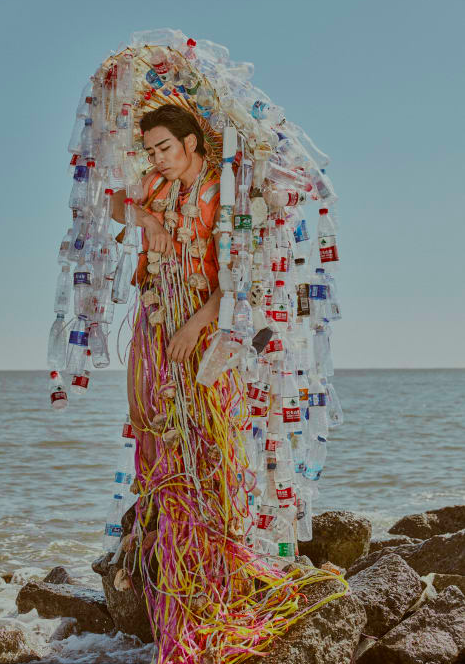Overconsumption & Waste in the Fashion Value Chain
Photo Credit: CNN Style, Chinese Artist Wan Yunfeng
“I THINK THAT WE’RE ABLE TO SCALE WHATEVER WE WANT TO SCALE AND...IT’S ALL ABOUT WHAT WE VALUE.”
On this episode of Unspun, Ngozi Okaro Founder and Executive Director of Custom Collaborative sits down with Lauren, Danielle, and Catherine to discuss her work and her vision for a US-based sewn goods industry.
Custom Collaborative
Custom Collaborative “trains, mentors, and advocates for and with low to no-income and immigrant women to build the skills necessary to achieve economic success in the sustainable fashion industry and broader society.” This Harlem, New York-based organization grew out of Ngozi’s own experience having her clothes custom-made for her tall frame. When Ngozi asked Guinean seamstress Mariama what she needed to grow her business, Mariama explained that she had always been a business owner. Still, she lacked access to ways to make her business more successful. This led Ngozi to think about all the women who already possess the skills of sewing and/or the business acumen yet need access to upskilling or capital to take their career or business to the next level. It was with this idea that Custom Collaborative launched over five years ago to provide a training program, business incubator, and cooperative to women in Harlem.
The Domestic Sewn-Goods Industry
“I THINK THERE IS A HUGE DISCONNECT ABOUT THE SKILL AND THE LABOR THAT GOES INTO MAKING CLOTHING.”
Outsourcing manufacturing deflates the prices of clothing to the point that we do not value our clothes. Overproduction and overconsumption can exist because of how inexpensive it is to produce clothing. And the low costs of garment manufacturing are a result of the low wages and the perceived low skill of garment workers.
Ngozi explains how COVID-19 revealed our dependence on overseas manufacturing and the consequential challenges, like not being able to get masks when we needed them. Ngozi’s team and 2020 cohort took on the enormous task of providing PPE to essential workers and community members when masks were in shortage. Ngozi provided webinars to the greater community on mask-making. Not to her surprise, attendants gave up on the task of constructing a simple mask. She hoped this was a sign of the recognition of the high skill of sewing.
Leading with Justice and Equity
The reinvigoration of the BLM movement following the murder of George Floyd in 2020 spurred companies in all industries to hire anti-bias and anti-racism consultants. Ngozi and Custom Collaborative, however, had been committed to anti-racism training for years before this surge. Ngozi explains that justice and equity have been core values since the inception of Custom Collaborative. The organization also requires anti-racism training for all the people they work with because it is important for the program’s participants to enter environments in which they can not only be comfortable but also thrive.
To hear more about Ngozi’s perspective on the fashion industry, Custom Collaborative, and what she hopes for the future of fashion and sustainability check out the latest episode of Unspun.

